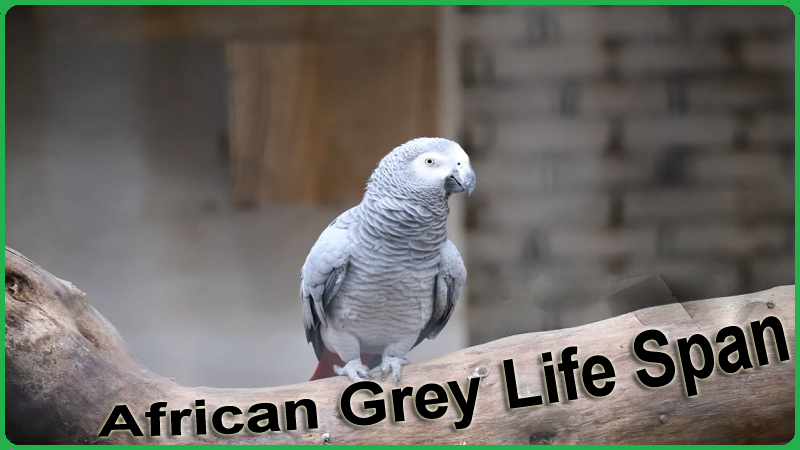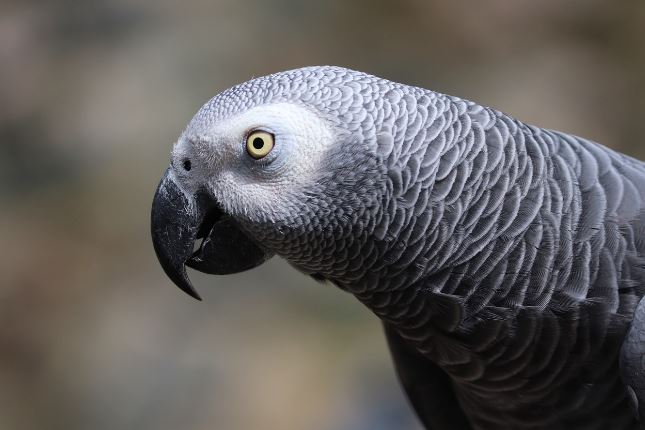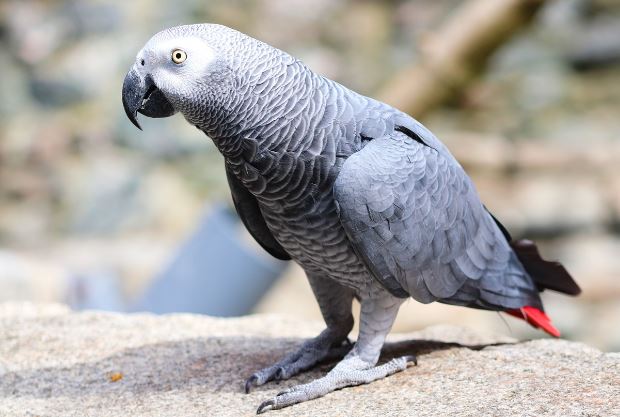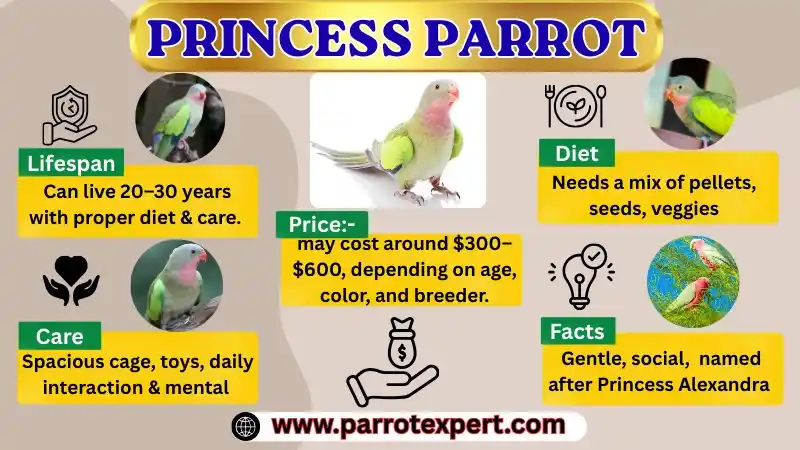The African grey parrots have the distinction, because they are one of the best mimics in nature. They are popular due to their longest live and highly intelligence. Average African grey lifespan is 23-30 year in the wild, and 40 to 50 in captivity. But, their confirmed age is recorded just less than 50 years.
Several factors can get influence, how long an African grey parrot will live. But, there are some extra things, if you implement them; then your pet parrot’s life will get increase.
Through this article, you will get all interesting aspects about the lifespan of African grey parrot that is one of the world’s most remarkable birds. Therefore, keep reading it to get full knowledge about this!!
How Long Do African Greys Live in The Wild?
Generally, African grey parrots can live for about 23 to 40 years in the wild region. But, their lifespan can influence with several parameters, like as source of food, predation, environmental, and human activities.
In their natural habitats across West and Central Africa, African greys depend on a diet (fruits, nuts, seeds, and insects). Such areas, where enough food resources available; they have longer lifespans. But, their shortage can affect their longevity. Baby parrots significant get to threat from some predators, including hawks, eagles, and monkeys.
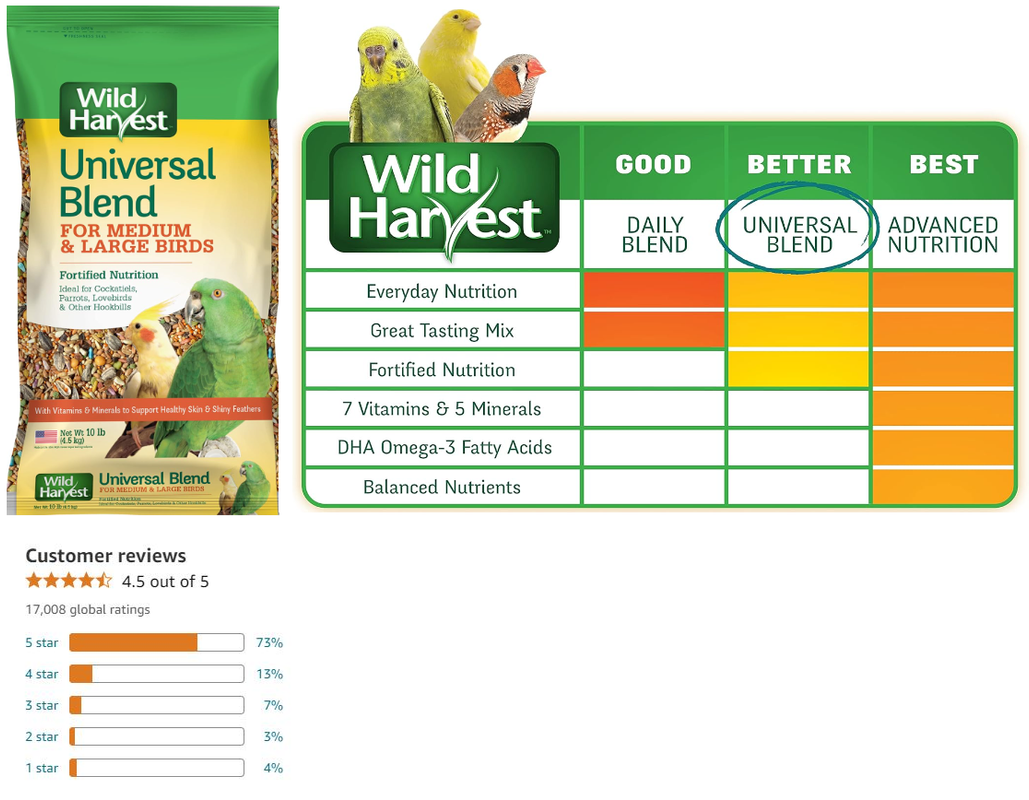
Environmental conditions are also play a critical role in their survival like as deforestation, agriculture, and urbanization. Increasing these activities, highly decrease the habitats of birds, and expose them to increased risks from predators and human activities.
Human interference, especially through pet trade, significantly gets heavy impacts on their populations. Protective regulations are implementing, still illegal trapping is carry on. Due to this, it leads to increase the mortality rates during capture and transportation.
How Long Do African Greys Live in Captivity?
African grey parrots, typically have a longer in captivity than in the wild, so their lifespans increasing from 40 to 60 years. But, some pet owners can reach them lifespan up to 70 years or more with giving best care.
In captivity, many factors help to increase their longevity. Primary factor is consistent and balanced diet. This includes fruits, vegetables, seeds, nuts, and specially formulated pellets that help to keep away from malnutrition.
Also Read: Can Parrots Eat Carrots? (Yes or Not} Feeding Guide
Another is regular veterinary check-ups and medical care. Proper medical care helps early detect illnesses, and further veterinary can get effective treatment of these illnesses with vaccinations.
Additionally, captive African greys get protection from predators and environmental hazards, such as extreme weather conditions.
Mental stimulation and social interaction are also important factors for their well-being. African greys are highly intelligent and social birds.
So, they take benefit from toys, training, and interaction with their human caregivers that help to prevent stress-related health issues.
African Grey Parrot Lifespan by Species
African grey parrots are divided into two main species like as Congo African grey parrot and Timneh African grey parrot.
Congo African Grey Parrot
Wild Lifespan: Approximately 23 to 40 years. But, their longevity depends on the food availability, predation, and environmental conditions in the wild.
Captive Lifespan: Near about 40 to 60 years, but someone can reach up to 70 years or more. Some factors can extend their lifespan like as stable environment, consistent nutrition, and regular veterinary care.
Timneh African Grey Parrot
Wild Lifespan: As similar to the Congo African grey, around 23 to 40 years. The same factors are food availability, predation, environmental conditions, and human interference
Captive Lifespan: Generally 40 to 50 years, though some individuals can live longer with excellent care. They take benefit from similar conditions as the Congo African grey, which shown above.
Some Factors that Affect African Grey Lifespan
Several factors influence the lifespan of African grey parrots, both in the wild and in captivity.
Also Read: Do Cockatiels Have Ears? Their Unique Hearing
In The Wild
Food Availability
- Abundance: Get varied and nutritious diet that can enhance their longevity.
- Scarcity: Limited food sources due to environmental changes can reduce lifespan.
Predation
- Natural Predators: Birds of prey (hawks and eagles) and mammals (monkeys) pose threats.
- Vigilance and Adaptability: More vigilant and adaptive individuals can survive longer.
Environmental Conditions
- Habitat Quality: Healthy, undisturbed forests help to give better living conditions.
- Habitat Destruction: Deforestation, logging, and urbanization decrease the available habitat and resources.
Human Activities
- Poaching and Pet Trade: Illegal capture for pet trade drastically affects populations.
- Pollution and Disease: Get exposure to pollutants and diseases can reduce health and longevity.
In Captivity
Diet and Nutrition
- Balanced Diet: A rich diet, including fruits, vegetables, seeds, nuts, and formulated pellets promotes health.
- Nutritional Deficiencies: Poor diet can lead to health issues and reduced lifespan.
Veterinary Care
- Regular Check-Ups: Regular veterinary visits help in early detection and treatment of diseases.
- Preventive Measures: Vaccinations and parasite control are essential to maintain health.
Mental Stimulation and Enrichment
- Toys and Training: Provide toys, puzzles and training opportunities keeps their minds active.
- Social Interaction: Interaction with caregivers and other birds prevents loneliness and stress.
Environmental Stability
- Safe Habitat: A stable and safe living environment reduces stress and risk of injury.
- Consistency: Consistent routines and care help in creating a secure and comfortable life.
Genetics
- Inherited Traits: Genetic factors also play a major role in health and longevity.
- Breeding Practices: Ethical breeding practices ensure healthier offspring with potentially longer lifespans.
Life Cycle of African Grey Parrots
The life cycle of African grey parrots (Congo and Timneh species) have several distinct stages from hatching to adulthood. Here, we will show you each one:
Egg Stage
- Nesting: African grey parrots nest in tree cavities, usually high up in canopy.
- Egg Laying: The female typically lays 2 to 4 eggs.
- Incubation: The female incubates the eggs for about 28 to 30 days, and male provides food and protection.
Hatchling Stage
- Hatching: Chicks hatch blind, naked, and helpless. So, they are relying completely on their parents for warmth and food.
- Feeding: Both parents feed own chicks regurgitated food.
- Growth: They get rapid growth during this stage, like as developing feathers and opening to their eyes.
Nestling Stage
- Development: Chicks continue to develop feathers and strengthen their muscles.
- Feathering: By 8 to 10 weeks, they are fully feathered.
- Learning: They start to learn basic survival skills from their parents.
Fledgling Stage
- Fledging: Chicks leave the nest around 10 to 12 weeks old. But, they stay close to their parents for guidance and protection.
- Flight: They begin to practice flying, improving their strength and coordination.
- Feeding Independence: Gradually, they learn to forage for food. Although they still rely on their parents for some time.
Juvenile Stage
- Independence: Juveniles become more independent, but often remain in the family group.
- Social Learning: They learn social behaviours and communication skills crucial for their survival.
Adult Stage
- Maturity: African grey parrots reach sexual maturity around 3 to 5 years of age.
- Breeding: Once mature, they can start the breeding cycle anew, seeking mates and nesting sites.
- Longevity: Adults can live for many years, with a lifespan of 23 to 40 years in the wild, and 40 to 60 years in captivity.
Elderly Stage
- Aging: Older parrots may show signs of aging, such as reduced activity and changes in feather condition.
- Care: Elderly parrots require special care, including dietary care and regular veterinary check-ups.
How Do Most African Greys Die?
Here are the essential ways African grey parrots often die:
In the Wild
- Predation by birds of prey and mammals
- Habitat Loss due to deforestation and urbanization
- Hunting and Poaching for the pet trade
- Disease such as psittacine beak and feather disease (PBFD) and avian influenza
- Food Scarcity from droughts and climate change
In Captivity
- Nutritional Deficiencies from improper diet
- Diseases like respiratory infections, parasitic infections, and PBFD
- Accidents involving toxic substances and physical injuries
- Stress from lack of mental stimulation and social interaction
- Old Age and age-related illnesses
How Long Can African Greys Live Without Food?
Generally, African grey parrots can survive without food for about 3 to 4 days. But, this period can vary depending on their overall health, age, and environmental conditions.
Also Read: Scarlet Macaw Lifespan: Facts & Care Tips for Longevity
Health and Age: Younger, healthier parrots may have longer periods without food as compared to older or sick birds.
Hydration: Access to water is crucial. Dehydration can be more life-threatening than lack of food. However, birds without water may only survive for a few days.
Environmental Conditions: Stressful conditions, extreme temperatures, and high activity levels may get short time they can survive without food.
Determine The Age of African Grey Parrot
There are a few key ways to determine the age of an African grey parrot:
Eye Color
- Baby parrots less than 6 months old have dark grey or black eyes
- The eyes lighten to a pale grey color by 1 year old and to a pale straw color by age 2
- The eyes deepen to yellow by 3 or 4 years old
Feather Coloration
- Juvenile African greys have grey undertail coverts that are tinged with grey
- Adults have red tail feathers
Behavior and Size
- African greys reach full maturity at 4-5 years old
- Determining the age of a mature bird is best accomplished through a veterinary exam
Knowing the Hatch Date
- Knowing when an adult African grey parrot was born is the only truly reliable way of knowing its exact age
Tips for Care to Increase the Life of African Grey Parrot
There are some tips to care for an African Grey Parrot to increase its lifespan, including:
Balanced Diet: Offer high-quality pellets, fresh fruits, and vegetables; avoid seed-only diets.
Variety: Include dark leafy greens, carrots, bell peppers, and other nutrient-rich foods.
Avoid Toxic Foods: Never feed chocolate, avocado, caffeine, alcohol, or foods high in salt, sugar, and fat.
Spacious Cage: Use a cage at least 24″ x 24″ x 36″.
Safe Materials: Ensure the cage is made of non-toxic, durable materials; avoid galvanized metals.
Proper Perches: Provide various types and sizes of perches, ideally natural wood.
Social Interaction: Spend daily quality time with your parrot to prevent loneliness.
Mental Stimulation: Provide puzzle toys, foraging toys, and interactive play items.
Regular Vet Visits: Schedule annual check-ups with an avian vet.
Clean Environment: Clean dishes daily and replace cage liners frequently.
Bathing: Offer regular bathing opportunities.
Stable Temperature: Keep the environment between 65-80°F with moderate humidity.
Natural Light: Ensure exposure to natural light or use full-spectrum lighting.
Avoid Toxins: Keep away from smoke, aerosol sprays, and non-stick cookware fumes.
Supervise Out-of-Cage Time: Always supervise when your parrot is out of the cage.
FAQs (Frequently Asked Questions)
Why Do African Grey Parrots Live So Long?
African Grey Parrots have long life due to their genetic makeup, highly intelligence, and social nature. In captivity, their lifespan can be extended through balanced diets, regular veterinary care, mental stimulation, and a safe environment.
Are African Greys Good Pets?
Yes! African Greys are good pets for experienced bird owners. They are highly intelligent, social, and capable of mimicking human speech. However, they need significant time, mental stimulation, and care.
What Is The Oldest African Grey Parrot?
The oldest known African grey parrot was a male named Tarbu that lived to be 55 years old. However, African greys have an average lifespan of 22.7 years in the wild. But, they can potentially survive for 40-60 years in captivity with proper care.
How Long Do African Grey Parrots Live As Pets?
As pets, African Grey Parrots typically live 40 to 60 years, with some can reach up to 70 years with proper care.
Verdicts Up
Now, we hope that you have been completely educated about African grey lifespan in the wild and captivity. However, the lifespan of African grey bird has an average 40 to 50 years as pet; but you can extend it with giving proper care.
Also Read: How Long Do Macaws Live? Macaws Lifespan in Wild & Captivity
If this content is useful for you, then share it along with your friends, family members, pet lovers or relatives over social media platforms like as Facebook, Instagram, Linked In, Twitter, and more.
Do you have any experience, tips, tricks, or query regarding on this? You can drop a comment!
Have a Nice Day!!

